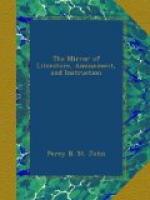We wonder why clergymen do not oftener write accounts of their parishes; not mere statistical accounts, though these are most valuable, as witness the contributions of the Scottish Clergy to the truly patriotic Sir John Sinclair’s work; but accounts comprehending every thing interesting to all human beings, whatever be their political or religious creed. A description of a church that has principally ceased to exist, is in general very, very, very dry; inscriptions on tombstones, without comment, or moral, are hard reading; an old pan dug up among rubbish proves a sore affliction in the hands of the antiquary, and twenty pages quarto, with plates, about a rusty spur without a rowel, is, in our humble opinion, an abuse of the art of printing. But how easy—how pleasant, to mix up together all sorts of information in due proportions into one whole, in the shape of an octavo—epitomizing every kind of history belonging to the parish, from peer’s palace to peasant’s hut! What are clergymen perpetually about? Not always preaching and praying; or marrying, christening, and burying people. They ought to tell us all about it; to moralize, to poetize, to philosophize; to paint the manners living as they rise, or dead as they fall; to take Time by the forelock, and measure the marks of his footsteps; to show us the smoke curling up from embowered chimneys; or, since woods must go down, to record the conquests of the biting axe; to celebrate the raising of every considerable roof-tree, to lament all dilapidations and crumbling away of ivied walls; to inform us how many fathoms deep is the lake with its abbeyed island—why the pool below the aged bridge gets shallower and shallower every year, so that it can no more shelter a salmon—what are the sports, and games, and pastimes of the parishioners—what books they read, if any—if the punishment of the stocks be obsolete—or the stang—or the jougs—if the bowels of the people yearn after strange doctrine—if the parish has produced any good or great murderer, incendiary, or other criminal. In short, why might not the history of each of the twenty or thirty thousand parishes of Great Britain—we speak at random—be each a history of human nature, at once entertaining and instructive? How infinitely better such books than pamphlets on political economy, for example, now encumbering the whole land! Nay, even than single sermons, or bundles of sermons, all like so many sticks—strong when tied all together, but when taken separately, weak and frush. We have no great opinion of county histories in general, though we believe there are some goodish ones, from which we purpose, ere long, to construct some superior articles. A county history, to be worth much, should run from sixty to six hundred volumes. No library could well stand that for many years. But a judicious selection might be made from the thirty thousand parish histories—that would afford charming reading to the largest family during the




